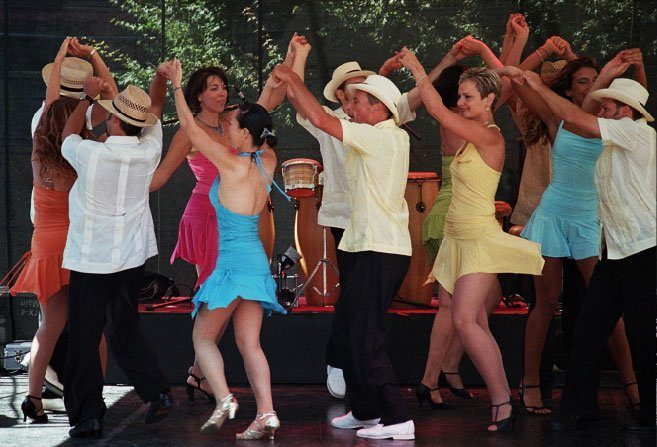Rueda de Casino – Cuban Style Salsa
Rueda de Casino (Rueda, Casino Rueda, Salsa Rueda) is a particular type of round dancing of Salsa. It was developed in Havana, Cuba in the late 1950s and early 1960s by the group Guaracheros de Regla and one of its main choreographers and creators was Jorge Alfaro from San Miguel del Padrón, a soloist of a comparsa.
Pairs of dancers form a circle, with dance moves called out by one person, a caller (or “líder” or “cantante” in Spanish). Many moves have hand signs to complement the calls; these are useful in noisy venues, where spoken calls might not be easily heard. Many moves involve the swapping of partners.
The names of the moves are mostly in Spanish, some in English (or Spanglish; e.g., “un fly”). Some names are known in slightly different versions, easily recognizable by Spanish-speaking dancers, but may be confusing to the rest.
Although the names of most calls are presently the same across the board, the different towns in Cuba use their own calls. This is because the pioneers of Rueda de Casino wanted to keep others from participating in their Rueda. Many local variations of the calls can now be found. They can change from town-to-town or even from teacher-to-teacher.
Casino Rueda scenes may be seen in the movie Dance with Me and in the music video clip No me dejes de querer by Gloria Estefan.
There are many different variations of moves in Rueda de Casino. The circle will either start from “al Medio” (normal closed hold with all the couples stepping in and out of the circle) or from Guapea (stepping forward on the inside foot and backward on the outside foot, tangent to the circle). Most forms have a caller who signals to the rest of the group what move will be next. Some of the most common moves in Rueda include: Dame, Enchufle, Vacila, and Sombrero. There are different hand motions that the caller can signal in case one’s voice cannot be heard over the loud music. For example, the hand signal for Sombrero is the caller tapping the top of his or her head. This move is signaled when everyone in the circle is stepping backward.
Salsa dance (Cuban Style)
Cuban-style salsa, also known as Casino, is a form of salsa dance that originated in Cuba. Dancing Casino is an expression of popular social culture; Latin Americans consider casino as part of social and cultural activities centering around their popular music. The origins of the name Casino are derived from the Spanish term for the dance halls where a lot of social Salsa dancing was done in Cuba during the mid-20th century and onward.
History
Historically, Casino traces its origin as a partner dance from Cuban Son dancing, and its rhythmic body motions from Afro-Cuban Rumba heritage. Son is considered an older version and ancestor to Salsa. Son is danced on delay measure upbeat (contra-tiempo) following the 2-3 clave (Son Clave) whereas Casino is usually danced on the downbeat break of 1 or 3 (a-tiempo). Musically, the beats 1, 3, 5 and 7 are considered downbeats; whereas 2, 4, 6 and 8 are considered upbeats. Casino was popularized in the late 1950s as the Cuban Son received upbeat and quicker arrangements by musicians. Casino has a very independent development, free from external influences such as Puerto Rican and North American dances partly due to the effect of the Cuban Embargo.
Have you ever seen Casino Rueda danced?
Watch video clip below of authentic Casino Rueda:
LATIN ENERGY CLASS PROGRAM– CASINO RUEDA COURSE
BASIC STEPS:
Salsa Step
Cuban Step (on the spot or walking)
Casino Step / Guapea
Rumba Step
Dile que no (Cuban CBL)
CASINO RUEDA:
Arriba, Abajo
Barre
Dame un Tarro or just “Tarro”
Dame un Tarro hasta la tuya
Dame
Dame Nuevo (with turn)
Dame con la mano
Dame Dos
Enchufa
Enchufa Doble
Exhibela
Enchufa Doble y Exibete
Las 3 pelotas
Mosquito
La prima
La hermana
Setenta (70)
Enchufa y la Flor
Enamorala
La Prima y La Estrella
Dame y Casate
El Puente
Sacude la mata y recoge los frutos (Shake the tree and pick up the fruit)
Uno (1)
Sacala a Pasear
Llevala al cielo (carrusel)
Other terms:
“mate” to end or exit a move
“otra vez” again
“bomba” or “palmas” clap
To register or inquire about this course, please contact us.
*** Thank you for visiting our CASINO RUEDA PAGE! ***

